You move into a new house where you plan to create a garden and grow vegetables. 2-3 weeks into the process you realize the resident neighborhood critters will not let it happen.
Your garden is their playground and your farm is their food source.
Squirrels are a pretty common sight in all of North America. These creatures manage to thrive in the wild as well as in your backyards.
Important Note: If you're tired of pests and want a reliable solution, then you should definitely consider seeking help from a professional pest control company. DIY solutions can be effective, but if you're dealing with a significant pest infestation, you don't want to rely solely on DIY methods. Pest control companies typically don't charge huge fees. You can fill out this form to receive free quotes from the top local pest control companies, and compare the quotes and see for yourself. Then, finally, your pest problems will be eliminated for good.
To know about the types of squirrels that you might see in your yards and their distinguishing features, read ahead. We’ve also listed down some common ways to keep the critters away from your homes and gardens.
Types Of Squirrels found in the USA
Squirrels are small furry rodents that belong to the family of Sciuridae. It is native to Asia, Africa, and the Americas. In North America, the squirrels are adapted to extreme temperatures and habitats like coniferous forests as well as suburban areas in the lower latitudes. Some common types of squirrel found in the USA are:
Eastern Gray Squirrel
- This too is native to North America, most common in eastern states of the USA.
- They have lighter gray fur compared to western gray squirrels. They also have a white underbelly. They are around the same size as their western counterparts, but they tend to have longer and bushier tails.
- Their uniqueness lies in the fact that they can descend a tree headfirst by rotating their hind ankles at 180 degrees.
- Their staple diet contains nuts, acorns, hazelnuts, seeds, etc. Due to this, they tend to reside in forests with deciduous trees, like oaks, hickory, etc. They can invade your yards and farms and keep being a regular visitor or resident even.
- Adult gray squirrels can live up to 12 years. Their average lifespan is 6 years.
- These cuties are mostly responsible for attacking and emptying your bird feeders.
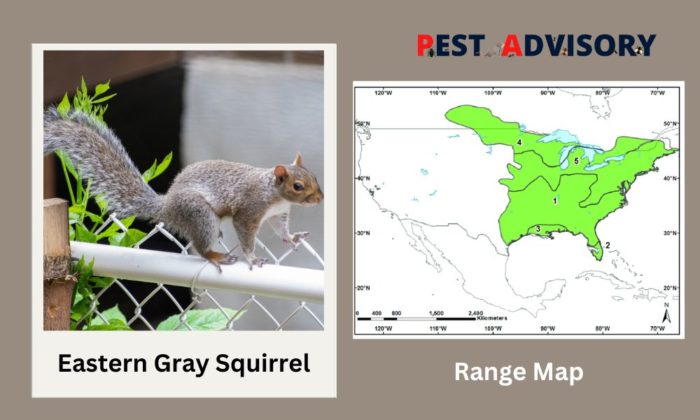
Some Gray Squirrels are also Black
- They are rare visuals in human habitats. They are mostly found deep inside dark woods. The black fur helps them in camouflage.
- The black fur is the result of the genetic mutation of white blood cells. The black fur helps to retain heat in higher altitudes.
- Sometimes they can be seen peacefully co-existing with gray squirrels. But they are hostile to other squirrels.
- Their average lifespan is 2-4 years.
American Red Squirrel
- This squirrel is relatively smaller and has a thinner tail.
- It is distinguished by its reddish-brown color fur.
- They are mostly found in coniferous forests and they feed on cones. They are also seen frequenting maple trees to satiate their sweet tooth craving. They store away food for winter too.
- They are pretty aggressive and if you try to pet them or feed them, you are likely to see them running away and start alerting nearby squirrels of your presence.
- They pose a challenge to the safety of your bird feeder as due to their small size and lightweight they can easily fit inside the feeders. They are the only squirrels who can chew through the plastic to get what they want.
- They have a high mortality rate in the first year of their life. If they do survive the first year, then they can live up to 8 years
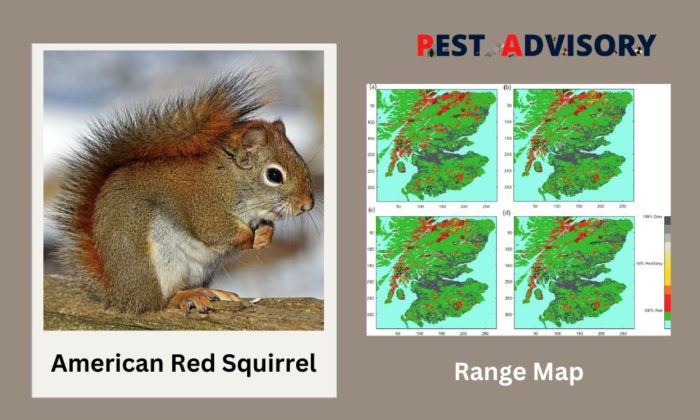
Fox Squirrel
- They are found in the eastern states of the USA. They too reside in deciduous forests feeding on a variety of nuts. Though not limited to that, they can be seen running around human settlements too.
- The fox squirrel is as large or sometimes larger than gray squirrels. They have extremely bushy tail whose edge is tinted with orange or yellow-colored fur. The upper part of the body is brownish-gray, while the lower side is yellow or brownish-yellow in color.
- They are the best jumpers of all types. They can make leaps up to 5 feet. These pose huge threats to bird-feeders, which even if hanging quite high, the fox squirrel is athletic enough to make the required jump especially if there are potential launchpads like chairs or tables or fences around.
- Their expected lifespan ranges between 12-18 years.
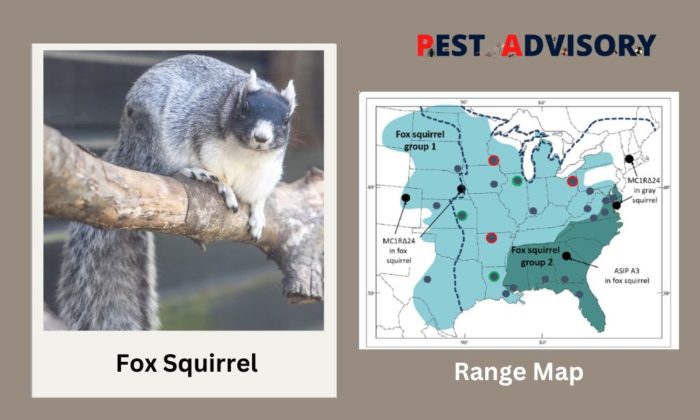
Abert’s Squirrel
- They are unique and easily distinguishable. Can be found only in some parts of the western USA.
- They usually have dark gray fur, with a brownish dusting on the back, and a white underbelly.
- They have distinct ears which contain long tufts of hair in them.
- Like typical squirrels, they eat a variety of foods. Their favorite is ponderosa pines. They consume the pine seeds and buds in summer and the cones and inner bark in winter. And because the ponderosa pines store so much food, these squirrels rarely store food for winter.
- Their shelter and protection are dependent on the ponderosa pines.
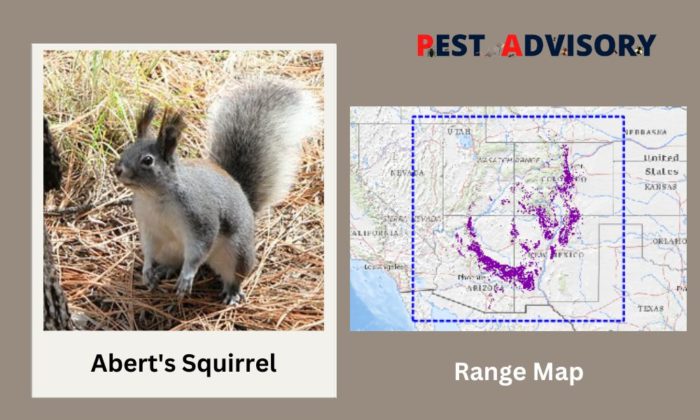
| Scientific Name | Common Name | Length (cm) | Weight (grams) | Lifespan (years) | Region |
| Sciurus carolinensis | Eastern Gray Squirrel | 42-55 | 400-600 | 6-12 | Eastern US |
| Tamiasciurus hudsonicus | American Red Squirrel | 28-36 | 200-250 | 2-8 | Northern US |
| Scirus niger | Fox Squirrel | 45-70 | 500-1000 | 12-18 | Eastern US except for New England |
| Sciurus aberti | Abert’s Squirrel | 46-58 | 540-971 | 7-8 | Western US |
| Scirus griseus | Western Gray Squirrel | 43-61 | 350-992 | up to 8 | Western Coast Of the US |
| Scirus arizonesis | Arizona Gray Squirrel | ~50 | ~567 | 2-8 | Arizona and New Mexico |
| Tamiasciurus douglasii | Douglas Squirrel | 33 | 150-300 | 5-6 | Pacific NorthWest Of North America |
| Glaucomys sabrinus | Northern Flying Squirrel | 25-37 | 110-230 | <4 | Northeast along the West Coast |
| Glaucomys volans | Southern Flying Squirrel | 21-26 | 56-85 | <5 | Eastern half Of North America |
| Glaucomys oregonensis | Humboldt’s Flying Squirrel | ~30 | Pacific Coast Of North America |
Western Gray Squirrels
- These are mostly tree squirrels and are the largest of them. They are shyer than the eastern gray squirrel. They are native to North America and found in coastal areas of the western USA.
- They weigh almost a kilogram. Their body-tail length is around 50cm.
- They are crepuscular (that is, they are more active during dawn and dusk) and stay on trees mostly. They come on grounds only while foraging.
- These squirrels are threatened because of habitat loss and competition from other types of squirrels.
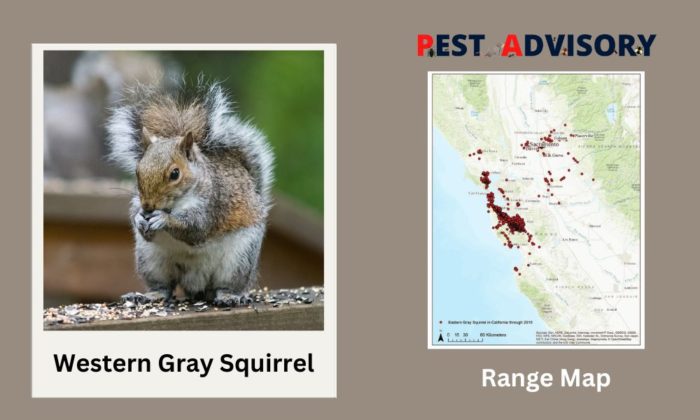
Arizona Gray Squirrel
- The Arizona gray squirrel is a species of tree squirrel in the family Sciuridae. The species is endemic to Arizona in the United States. It was first described by American naturalist Edward William Nelson in 1899.
- The fur of the Arizona gray squirrel is grayish brown on the back and whitish on the belly. There is often a reddish tinge to the back fur, particularly among males during the breeding season. The ears are relatively large and are tufted in some individuals.
- The Arizona gray squirrel is found in woodlands throughout much of Arizona, at elevations ranging from 1,000 to 2,500 meters (3,280 to 8,202 feet). It generally avoids areas with dense human development but has been known to inhabit urban parks and gardens.
- The diet of the Arizona gray squirrel consists primarily of acorns and other nuts, although it will also eat fruits, seeds, and insects when available and they feast on flowers. The species plays an important role in seed dispersal for several types of oak trees found in its range.
- Arizona gray squirrels are generally solitary animals, although they may form small groups.
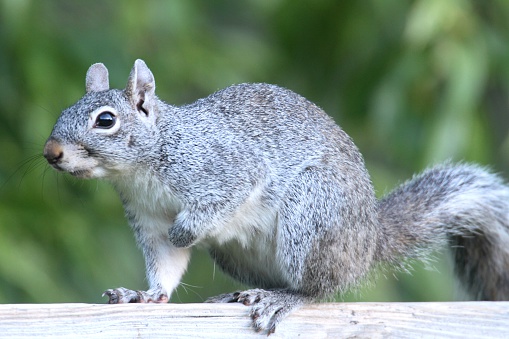
Douglas Squirrels
- They are found in the far west of the USA, particularly in the pacific northwest.
- They are very small in size.
- They are unique because they appear to change their coat color over the year. During summer they are grayish or greenish-brown in color with a distinct black mark and pale orange underbelly. In winter the coat color changes to brown and gray and tufted ears appear.
- Their favorite food is Douglas firs, Sitka spruces.
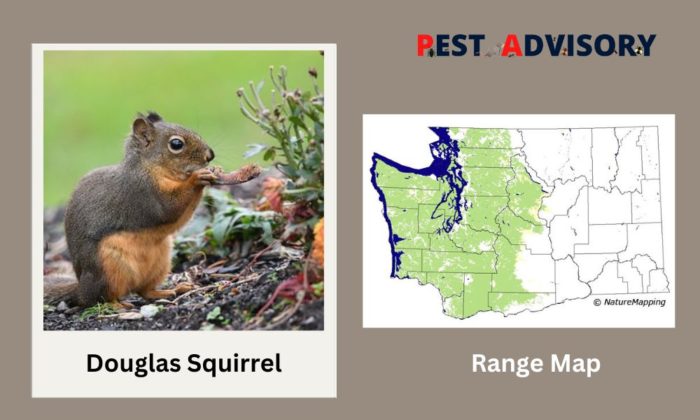
Flying Squirrel
- They are rarely seen because they tend to be nocturnal.
- Smaller in size they have light brown fur and huge black eyes.
- Contrary to the name, they cannot fly nor do they have wings. They just have a loose fold of skin-like membrane under their arms. This helps them to glide which appears to be flying.
Types Of Flying Squirrels
- Northern Flying Squirrel
- Southern Flying Squirrel
- Humboldt Flying Squirrel
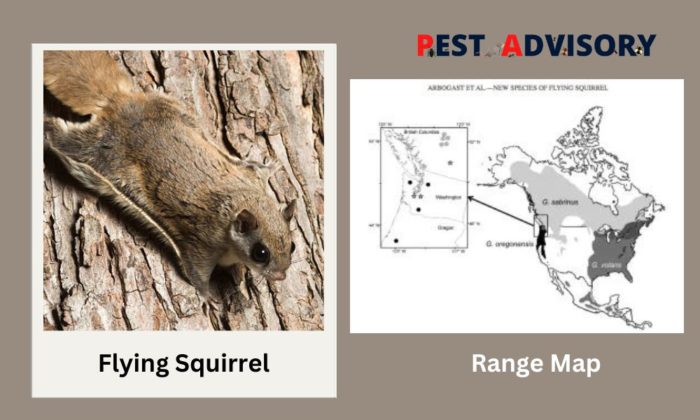
Final Words
It is not like there are different solutions to deal with different squirrels. Regardless of their types, they are menaces. Among the different types, it is the gray and red squirrels that are potential threats to homes and yards.
So whatever type of squirrel is a problem, try out the above solutions. If it is severe you should call professional pest control, because squirrels are known to cause structural damage to homes that might have dangerous consequences.

